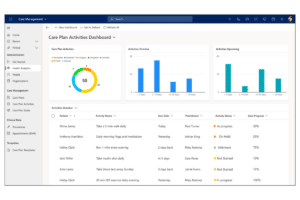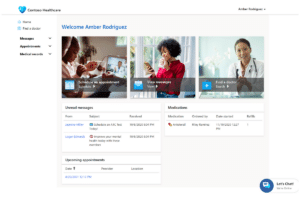Field Service Management for Home Healthcare Providers
Discover how home healthcare services are using FSM solutions to improve efficiency, profitability, and most crucially, patient outcomes – without making compromises elsewhere.
Discover how home healthcare services are using FSM solutions to improve efficiency, profitability, and most crucially, patient outcomes – without making compromises elsewhere.
Table of Content
For patients, home healthcare services are, well, regular healthcare services – delivered in a different (read: more convenient) way.
For providers, venturing into the field means taking on way more than most businesses – either in the healthcare space or more traditional field services orgs – are prepared to handle.
That means, you’re juggling all of the regulatory requirements, privacy laws, and complexities of running a medical practice. You’re managing a mobile workforce that isn’t out there fixing machines. Instead, they’re caring for real people – many of whom are quite vulnerable – with individual needs and preferences.
On top of that, those patients expect providers to meet the same standards as, say, Uber Eats or Amazon – with real-time ETAs, quick turnarounds, and plenty of self-service options.
This article looks at how real home healthcare providers are using FSM solutions to improve efficiency, profitability, and most crucially, patient outcomes – without making compromises elsewhere.
For home healthcare providers, field service solutions aren’t always a perfect fit. Most out-of-the-box solutions are still designed to meet the needs of traditional service-based orgs where technical expertise and service quality are the primary differentiators.
Sure, practitioners benefit from the same scheduling or resource management capabilities HVAC companies, manufacturers, and utilities rely on. But, home healthcare doesn’t exactly square with that familiar model and providers need solutions that work seamlessly with the ones they’re already using to run their practice.
Here are some examples of how real healthcare companies are using FSM solutions to take their practice on the road.
The best FSM platforms serve up granular insights into all home healthcare operations in context with each practitioner, patient, and situation.
You can track patient satisfaction against average response times and completion rates.
You can combine and manipulate data in new ways or take advantage of predictive forecasting and modeling capabilities to inform future plans, train staff, and prepare for the scariest “what-if” scenarios — long before they take everyone else by surprise.
What’s more, many come equipped with AI/ML-powered guidance, out-of-the-box insights, and automation capabilities.
Really, though, your first goal is building a health management ecosystem that extends existing operations out into the field, while also maintaining the same high standards for privacy, compliance, and care.
If you’re already using Microsoft Dynamics 365, SAP, NetSuite, or some other ERP to run core operations, you’ll want to stay within that same product family when searching for FSM solutions.
So, for Microsoft users, that might mean subscribing to the D365 Field Service module, then looking toward industry accelerators or ISV apps to fill capabilities gaps and add in some extra layers of protection.
At the height of the pandemic, Mater Health Group joined the Microsoft Catalyst program, which helps orgs in select industries accelerate digital transformation.
Microsoft helped the Catholic non-profit build an integrated system spanning all operations – research, education, healthcare services, etc. – using D365 Field Service and Customer Service, Power BI, Azure, and MS 365 apps.
Now, Mater Health has a single platform that allows them to optimize resources and provide efficient, personalized care at scale.
Microsoft also has several “Cloud for Healthcare” solutions, designed to enhance the out-of-the-box capabilities of D365 Finance, Field Service, SCM, and other MS solutions.
With D365, users can track and enforce compliance standards, ensuring that all services are performed per industry regulations. All MS solutions are also embedded with data management features that meet HIPAA, GDPR, and CCPA requirements, as well as consumer privacy and financial reporting requirements.
Home healthcare programs aren’t exactly new.
Old school doctors (and their big black bags) made house calls all the time. And – many states (and countries) have long offered programs designed to help elderly patients to “age in place” rather than in a nursing home or provide mobile support to those with mobility challenges or chronic conditions.
When COVID hit, home-based services started gaining more traction among a broader population due to safety concerns and mobility challenges, among other things. Three years on, many providers have embraced home care as part of a holistic strategy focused on prevention and wellbeing rather than treating patients after they get sick.
FSM solutions allow providers to modernize home care at every level – scheduling, workforce optimization, inventory tracking, data management, and so on.
They also facilitate communication and collaboration between care professionals, allowing them to coordinate services and share patient care regimens, medications, and medical histories – from any location or device.
MS Cloud for Healthcare users can build model-driven dashboards for D365 in Power Apps that enable data-driven decisions and empower practitioners both in the field and in the office.
Dashboards can be used to track high-level data like patient and provider analytics, trends, and patient demographics.
For, example, the screenshot below provides a universal view of patient care plan activities. This allows users to get a pulse on patient progress and flag anything requiring further action or investigation.
Think – following up with patients who haven’t made progress toward goals or working with practitioners to revise plans that aren’t working.

Image Source: Use Care management | Microsoft Learn
Health App dashboards can also be used to manage individual care plans and active cases, or provide context-specific insights to caregivers in the field.
For many patients, accessing care is bureaucratic, expensive, and all-around dehumanizing.
Connected health ecosystems allow providers to give patients more transparency and control of their own health outcomes. They can access records through user-friendly portals, take advantage of telehealth services, book home services, and track caregiver ETAs in real-time.

Image Source: Use Patient access | Microsoft Learn
With Connected Field Services enabled, providers can capture patient data from connected devices like wearables, tablets, or medical equipment remotely. They can then analyze that data against diagnostic information, medical records, etc.
This allows them to collaborate with patients on care strategies, design personalized “care journeys,” or even develop novel solutions for improving health outcomes on a larger scale.
New Zealand provider Volpara Health used Azure IoT to create a custom solution to improve early breast cancer detection and prevention methods. The platform analyzes patient records, mountains of mammography data, research papers, and AI imaging to assess cancer risk.
What’s really interesting is, Volpara uses Microsoft Sentinel, along with Defender for Cloud, IoT, and Endpoint to not only safeguard sensitive information, but to identify and flag cancer risks in real-time.
This allows providers to notify patients ASAP and put together a tailored plan for treatment or prevention.
New challenges rarely cancel out existing complexities. In most cases, they make everything worse.
Healthcare providers are already dealing with insurance claims, billing issues, and HIPAA rules. They’re also juggling competing pressures to maximize profits and care for patients – often during the worst moments of their lives.
As providers embrace new delivery models, they also embrace the same challenges traditional field service orgs have faced since the very beginning – travel costs, scheduling conflicts, asset management, customer communications, and so on.
By providing real-time insights, streamlining core operations, and automating routine tasks, FSM software enables providers to deliver high-quality care to more patients – without running afoul of patient privacy laws or quality and compliance requirements.
But, building a stack capable of unlocking these benefits is the first major hurdle you’ll need to overcome before taking your medical practice on the road.
Velosio’s field service team has the real-world experience and technical expertise needed to transform medical device operations at every level. With 30+ years in the Microsoft Partner game, we can help you get to the cloud, build the perfect stack, and optimize your strategy for years to come. Get in touch to find out more.